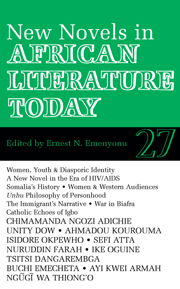Book contents
- Frontmatter
- Contents
- Notes on Contributors
- EDITORIAL ARTICLE: The African Novel in the 21st Century: Sustaining the Gains of the 20th Century
- ARTICLES
- Resurgent Spirits, Catholic Echoes of Igbo & Petals of Purple: The Syncretised World of Chimamanda Ngozi Adichie's Purple Hibiscus
- Ambivalent Inscriptions: Women, Youth & Diasporic Identity in Buchi Emecheta's Later Fiction
- The Interrupted Dance: Racial Memory in Isidore Okpewho's Call Me By My Rightful Name
- The Ivorian Crisis & Ahmadou Kourouma's Posthumous Political Novel Quand on Refuse on dit non
- Ngũgĩ's Wizard of the Crow: Women as the “Voice of the People” & the Western Audience
- The Ankh & Maat: Symbols of Successful Revolution in Ayi Kwei Armah's Osiris Rising
- A New African Youth Novel in the Era of HIV/AIDS: An Analysis of Unity Dow's Far & Beyon'
- The Prison of Nigerian Woman: Female Complicity in Sefi Atta's Everything Good Will Come
- Manufacturing Skin for Somalia's History: Nuruddin Farah's Deep Hurt in Links
- A Zimbabwean Ethic of Humanity: Tsitsi Dangarembga's The Book of Not & the Unhu Philosophy of Personhood
- ‘Coming to America’: Ike Oguine's A Squatter's Tale & the Nigerian/African Immigrant's Narrative
- Chimamanda Ngozi Adichie's Half of a Yellow Sun
- REVIEW
- Index
The Ivorian Crisis & Ahmadou Kourouma's Posthumous Political Novel Quand on Refuse on dit non
from ARTICLES
Published online by Cambridge University Press: 05 April 2013
- Frontmatter
- Contents
- Notes on Contributors
- EDITORIAL ARTICLE: The African Novel in the 21st Century: Sustaining the Gains of the 20th Century
- ARTICLES
- Resurgent Spirits, Catholic Echoes of Igbo & Petals of Purple: The Syncretised World of Chimamanda Ngozi Adichie's Purple Hibiscus
- Ambivalent Inscriptions: Women, Youth & Diasporic Identity in Buchi Emecheta's Later Fiction
- The Interrupted Dance: Racial Memory in Isidore Okpewho's Call Me By My Rightful Name
- The Ivorian Crisis & Ahmadou Kourouma's Posthumous Political Novel Quand on Refuse on dit non
- Ngũgĩ's Wizard of the Crow: Women as the “Voice of the People” & the Western Audience
- The Ankh & Maat: Symbols of Successful Revolution in Ayi Kwei Armah's Osiris Rising
- A New African Youth Novel in the Era of HIV/AIDS: An Analysis of Unity Dow's Far & Beyon'
- The Prison of Nigerian Woman: Female Complicity in Sefi Atta's Everything Good Will Come
- Manufacturing Skin for Somalia's History: Nuruddin Farah's Deep Hurt in Links
- A Zimbabwean Ethic of Humanity: Tsitsi Dangarembga's The Book of Not & the Unhu Philosophy of Personhood
- ‘Coming to America’: Ike Oguine's A Squatter's Tale & the Nigerian/African Immigrant's Narrative
- Chimamanda Ngozi Adichie's Half of a Yellow Sun
- REVIEW
- Index
Summary
Ahmadou Kourouma is best known for his first novel Les soleils des indépendances (1968; trans. The Suns of Independence). After initial difficulties with the publication in France, the novel was subsequently much acclaimed for its original use of the French language that made it sound like the author's native Malinké. It also criticized African leadership and one-party systems that prevailed all over Africa. This critical trend continued in his later works that denounced foreign forces of domination; African dictators and African regression or ‘bastardisation,’ to borrow the author's own expression were also not spared.
Certainly for the artistic value of his works and surely because it seemed that his criticism was primarily directed toward Africans, Kourouma was much celebrated in Europe. The first novel won three prizes namely, ‘Prix de la Francité,’ ‘Prix de la Tour-Landry,’ ‘Prix de l'Académie Française,’ and ‘Prix de l'Académie Royale’ of Belgium. His second novel, Monné, outrages et défis (1990; trans. Monnew), received three prizes including the ‘Grand Prix littéraire d'Afrique Noire’ for outstanding francophone African works. The author's third novel, En attendant le vote des bêtes sauvages (1998; trans. Waiting for the Wild Beasts to Vote), also captured three distinctions, while the fourth one, Allah n'est pas obligé (2000; trans. Allah is not Obliged), crowned them all with the prestigious ‘Prix Renaudot.’
- Type
- Chapter
- Information
- New Novels in African Literature Today , pp. 42 - 54Publisher: Boydell & BrewerPrint publication year: 2009

